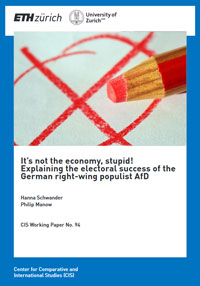Conference held by Centre for Social Policy Research and Sciences Po, Paris on September 25-26, 2014.The aim of this workshop was to bridge the research on party competition, electoral politics and welfare state transformations. With quite some cross-country variation, we witness major changes in the welfare state arrangements all over Europe since the beginning of the new millennium. In Continental Europe, for example, reputed for its reform incapacity, large parts of the welfare state underwent substantial reforms in the recent years. Even more profound reforms have been provoked in the wake of the European sovereign debt crisis in Spain, Portugal, and Greece. The welfare state was not only the ‘principal institution in the construction of post-war capitalism’, but also helped to underpin stable party-voter alignments when the cultural milieus on which given parties were based started to erode in the 1970s. Today, these stabilizing resources are largely depleted as the need to reform, recalibrate and retrench now meets a much more volatile electoral environment. We want to reflect on the effects of these welfare state transformations on party competition in a broader perspective. Given the importance of welfare states for structuring political contestation and the magnitude of recent reforms, our starting hypothesis is that the transformations of the welfare states should impact on various aspects of political competition.
A recent literature is concerned with the electoral consequences of such reforms. It asks whether governments will indeed be punished for retrenching the welfare state or whether welfare state friendly parties are spared from such punishment. But more encompassing analyses looking at the effects on party competition, the consequences for voter behavior and new reform coalitions are still lacking. This is surprising considering that the welfare state is one of the major objects of political contestation and the economic dimension of political competition is largely structured by attitudes and positions towards the (welfare) state. At the same time, the redistributive and thereby political consequences of reforms are complex, since social policy is multidimensional: Many reforms cut back on passive protection against ‘old’ risks while implementing new schemes to cope with ‘new’ social risks and reinforcing the employment orientation of social policies.
Yet, party competition is changing as well. Research on changes in party systems often emphasizes the effects of long-term structural trends on the structuring capacity of traditional conflict lines on party-voter alignments or party competition. The welfare state’s influence on potential reconfigurations of these party-voter alignments or party competition is, however, often neglected. Yet, welfare state changes impact party competition as well as party-voter links. Losers of the recent welfare state reforms, for example, might vote increasingly for parties at the poles of the party spectrum. Potentially, this leads to a stronger polarization and fragmentation of party systems, but it could also lead to a lower legitimacy of governments as larger parts of the population are not represented in governments. Hence, we are interested in the effects of welfare state reforms on political alienation and vote abstention, on political polarization and the rise of radical left and right parties, as well as on the potential re- positioning of mainstream parties as a reaction to these new challengers – a repositioning that might also take place on ‘non-economic’ dimensions of party contestation. Has the ‘re-moralization’ of politics to do with the depletion of politics’ material resources?
Thanks to the generous funding of the CRC "Transformations of the State" and Sciences Po, Paris, the following group of scholars were invited to discuss the above outlined questions:
- Alexandre Afonso, King's College, London, UK
- Ben Ansell, Nuffield College, Oxford University, UK
- Silja Häusermann, University of Zurich, Switzerland
- Carsten Jensen, University of Aarhus, Denmark
- Herbert Kitschelt, Duke University, USA
- Johannes Lindvall, University of Lund, Sweden
- Kimberly Morgan, George Washington University, USA
- Jonathan T. Polk, University of Gothenburg, Sweden
- Philipp Rehm, University of Ohio, USA
- Jan Rovny, Centre d'études européennes, Sciences Po, Paris, France
- Allison Rovny, Centre d'études européennes, Sciences Po, Paris, France
- David Rueda, Nuffield College, University of Oxford, UK
Conveners:
Philip Manow, Centre for Social Policy Research, University of Bremen, Germany
Bruno Palier, Centre d'études européennes, Sciences Po, Paris, France
Hanna Schwander, Centre for Social Policy Research, University of Bremen, Germany
Contact:Prof. Dr. Philip ManowSOCIUM Research Center on Inequality and Social Policy
Mary-Somerville-Straße 7
28359 Bremen
Phone: +49 421 218-58580
E-Mail:
manow@uni-bremen.de 















